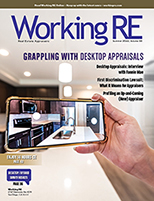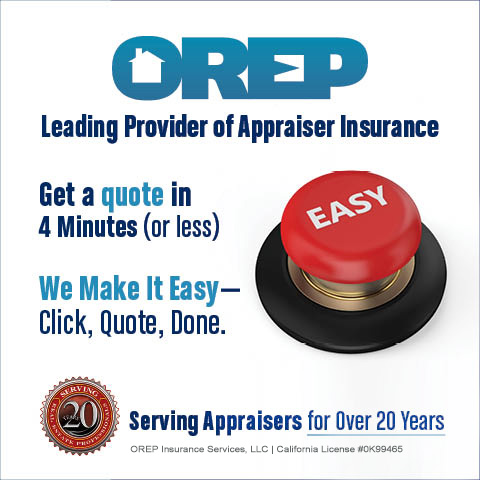 |
> Trainee Workshop
> OREP E&O |
Let’s Confer
by Hal Humphreys, Appraiser eLearning
The mind-numbing slide deck, with 250 words per slide, as if the presenter copied the text from a book and created a 20-foot-tall PowerPoint of unreadable ‘content.’ There’s not a chance anyone on the back row could make out anything other than a vague shape of a paragraph. Maybe transitions— hey presto—bounce each word-heavy slide across the screen, or words drop into place, or appear as if being typewritten across a screen. The speaker who obviously didn’t prepare—in any way. No outline. No slides. Just war stories in a disjointed stream-of-consciousness-Jack-Kerouac-without-the-poetry ramble. Yeah, sometimes conferences are a bore.
The chance encounter in a hallway. The shared experience of learning. That exhibitor you’ve always wanted to meet. The company with which you’d love to work. The presenter who entertains and engages with elegant slides and a well-crafted narrative. That cocktail you share with a new friend after a long day of listening to people speak, some amazing, some, as noted above, not so much.
Taking the time and spending the money to attend a conference can be, if you think of it in the wrong way, a drain. The more accurate way to consider the investment in time and money, is just that—an investment.
Here’s what you need to know about conferences:
First, not all conferences are equal. You’ll be able to sus out pretty quickly if a conference is worth your time by doing a hint of research ahead of time. Check out the conference website. If there is no website. If the landing page has the feel of my-space-circa 1994, maybe skip it. If, on the other hand, the website is clean and professional, check it out.
Who’s sponsoring the event? Are vendors you want to learn about sponsoring the event? Is there a database or software provider that you’ve been curious about going to be there? Spend a little time researching what companies are planning to be in attendance. If a sponsor you’ve always wanted to connect with is going to be there, check it out.
Who’s speaking? Is that one lady, the expert in that one thing, speaking? Is that one guy you’ve always stalked online speaking? There’s a good chance that you will be able to meet the speakers. Spend a little time researching the speakers and see if there’s a topic or person you about which you really want to learn more? If so, check it out.
I’ve been to small conferences, with less than 150 attendees, that were amazing. I’ve visited much larger conferences with 3,000 plus attendees that were equally amazing. The sweet spot for me is somewhere between 200 and 1,000 attendees. Too big, and the chance of meeting that one speaker you’re interested in diminishes. Too small, and you’re likely to run across the war-story-ramble speaker and not get much out of it. That said, I’ve met some of my favorite people at a 3,000 plus conference. I’ve also made some of the best contacts in my entire professional career at a conference with barely 100 people.
(story continues)
Here’s the thing: You get out of a conference what you put into it. Spend the weekend wall-flowering at the back of the room and you’ll likely not meet new people. Spend the weekend in your room, eating room service and checking email, and you’ll likely not meet new people.
If you’re going to spend the time and money to go to a conference, you might as well get out and meet people. Spend a little time researching the sponsors, speakers, and attendees and make your choice. Then be ready to dive in and participate.
What are the benefits of attending a conference? Well, there’s the educational aspect. You’ll likely go home with some much-needed continuing education credits. I mean, we all need CE to maintain our licenses, right? I would suggest that the CE is a valid benefit, but way down low on the list of gains.
Networking is on the top. If you’re going take the time to travel, miss out on work, spend the money on conference fees, airfare, and hotels, I beg you, get out and meet people. At breaks, make it a point to meet one new person. During your strolls through the exhibit hall, spend some time chatting with the sponsors. Get to know the people. After a full day of lanyard-wearing-hand-shaking-conferencing, you’ll have a good feel for which of those new people you might like to know better. Ask them out for a drink, or to a dinner. Get out and meet people.
Seriously, the real and enduring benefit of attending a conference is connection. Sometimes you’ll make strictly professional connections. Other times you’ll make life-long friendships. Many times, both.
I attended a conference in California this summer. I only had one day to dedicate to the event, but during that one day, I made several good connections. I’ve already worked with three of them. That’s just from one day of conferencing.
There are a number of conferences coming up from which you can choose.
There are local chapter/regional meetings (usually on the smaller side) that may appeal to you. I recently made the trip out to Palm Springs, CA for a two-day regional conference (note: I do not live anywhere near California, but I have an interest in some of the speakers and sponsors). Open your options and pick a locale you’ve always wanted to visit where speakers/sponsors you’ve always wanted to meet are going to be convening for a few days.
There are some bigger conferences coming up in the not-too-distant-future that may fit your needs. Like I said, larger conferences offer more sponsors, more speakers, and more attendees (all potential connections). In August I’ll be speaking at a small conference in Austin, TX (Association of Texas Appraisers). In September, I’ll be involved in two shows (speaking at Valuation Expo and co-hosting the Appraisal Summit), both in Las Vegas. I’m looking very much forward to meeting some of you there.
I get it. We work in an industry of small shops, many of us one person or two-person offices. It’s hard to make the commitment of time and money (fees, airfare, hotel, meals, drinks, etc.) to attend a conference. However, if you find a conference that interests you, give it a whirl. Block out the time. Spend the money. Go and make connections. I’d strongly suggest you come out to the Appraisal Summit and find me. I’d love to meet you.
Stay safe out there!
About the Author
Hal Humphreys is a career-long real estate appraiser. He grew up measuring houses with his father, an appraiser. In the course of the past 30 years, Mr. Humphreys has appraised property across the country. He is a hearing officer for the Davidson County Board of Equalization. He has been a contract investigator/reviewer for the State of Tennessee Department of Commerce and Insurance. He also assists attorneys who represent citizens accused of crimes. Mr. Humphreys is partner in Appraiser eLearning and is the director of education for StoryboardEMP, llc, an education media company.
Tips for Smoother Appraising
CE Online – 7 Hours (45 states)
How to Support and Prove Your Adjustments
Presented by: Richard Hagar, SRA
Must-know business practices for all appraisers working today. Ensure proper support for your adjustments. Making defensible adjustments is the first step in becoming a “Tier One” appraiser, who earns more, enjoys the best assignments and suffers fewer snags and callbacks. Up your game, avoid time-consuming callbacks and earn approved CE today!
Sign Up Now! $119 (7 Hrs)
OREP Members: Save 10%
>Opt-In to Working RE Newsletters
>Shop Appraiser Insurance
>Shop Real Estate Agent
Insurance
Send your story submission/idea to the Editor:
isaac@orep.org



